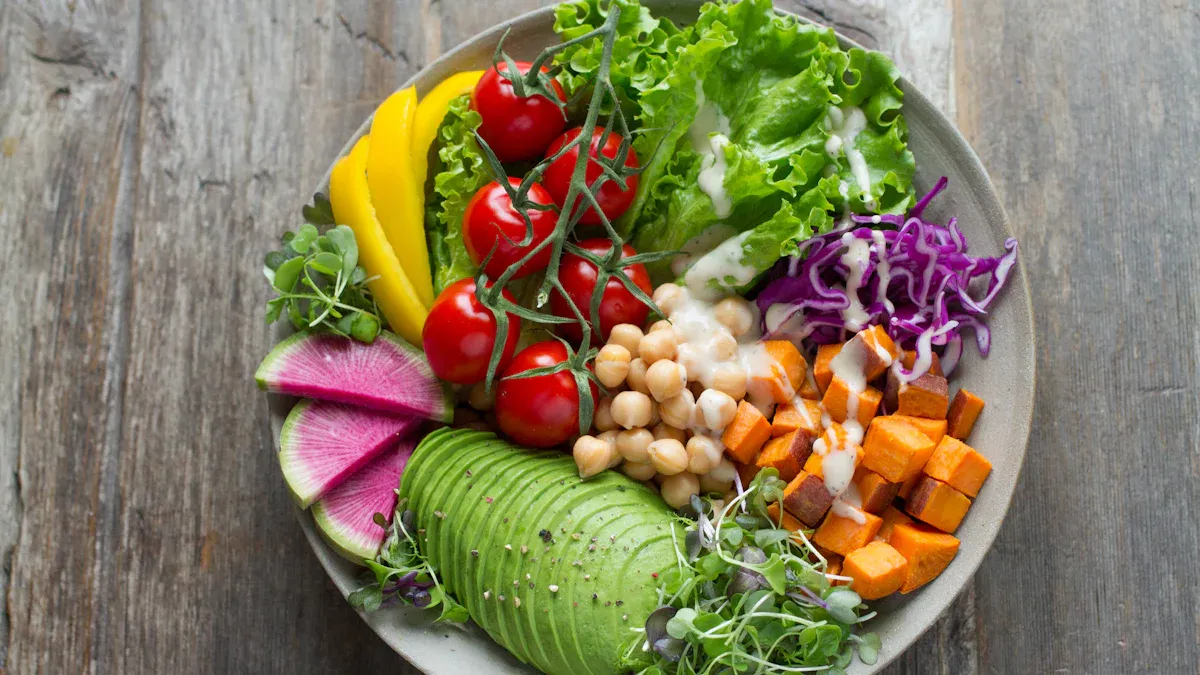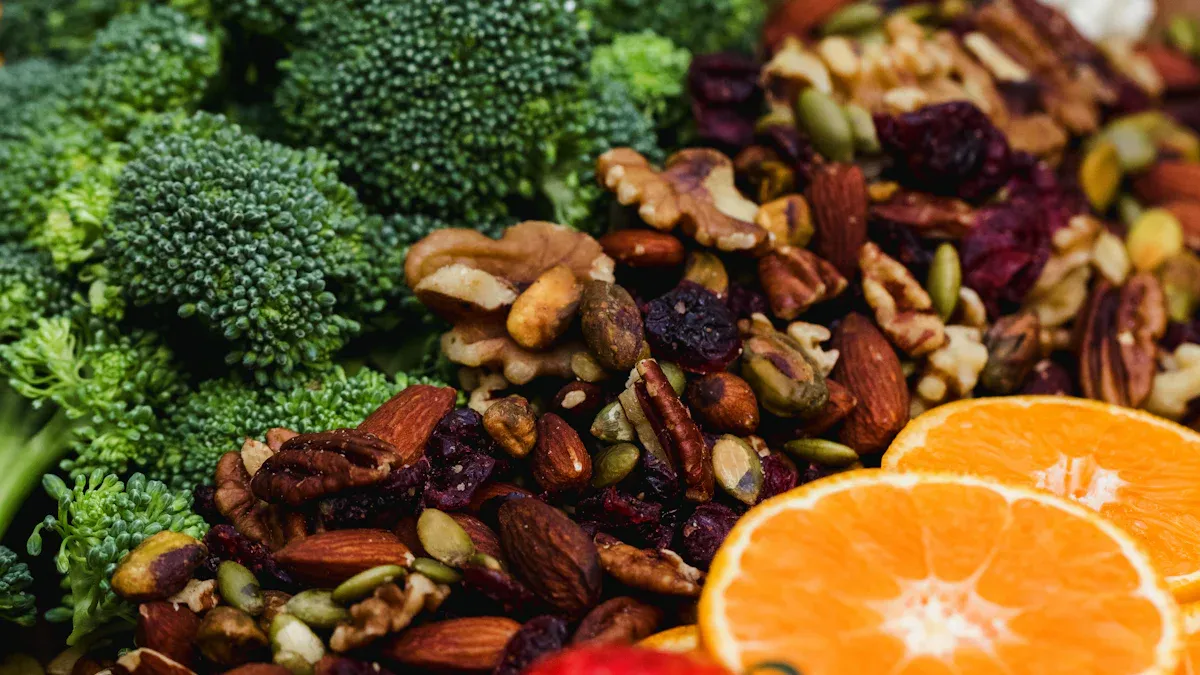How Nutrition Impacts Cancer Prevention and Treatment

Your diet plays a powerful role in shaping your health, especially when it comes to cancer, which raises the question: 'Nutritional Therapies in Oncology: Fad or Fact?' Research shows that eating a balanced diet after a cancer diagnosis can improve recovery and survival rates. For example, a study in Northern Italy found that women with breast cancer who followed a Mediterranean-style diet lived longer. This highlights how the right foods can support your body’s ability to heal. By choosing nutrient-rich meals, you give yourself the best chance to reduce risks, recover faster, and feel stronger every day.
Key Takeaways
Eating fruits, vegetables, and whole grains can help prevent cancer.
Staying at a healthy weight with good food and exercise lowers risks.
Protein-rich and high-calorie foods help keep strength during treatment.
Custom meal plans made for you can improve treatment and well-being.
Working with dietitians gives expert advice to handle side effects better.
Nutrition and Cancer Prevention

The Importance of a Balanced Diet
How diet impacts cancer risk
Your diet plays a critical role in shaping your cancer risk. A balanced diet rich in fruits, vegetables, and whole grains provides essential nutrients that help repair damaged cells and reduce inflammation. Antioxidants in these foods combat free radicals, which can lead to cancer. Research shows that dietary factors contribute to 20–25% of cancer cases, making nutrition a powerful tool in prevention. For example, consuming whole grains and calcium has been linked to a lower risk of colorectal cancer, while alcohol consumption increases the risk of several cancers, including breast and liver cancer.
Dietary Factor | Cancer Type(s) Associated | Association Type |
|---|---|---|
Alcohol consumption | Postmenopausal breast, colorectal, esophageal, head & neck, liver | Positive association |
Dairy products, milk, calcium, wholegrains | Colorectal cancer | Inverse association |
Coffee consumption | Liver cancer, skin basal cell carcinoma | Inverse association |
The role of weight management in prevention
Maintaining a healthy weight also reduces your cancer risk. Excess body fat increases inflammation and hormone levels, which can promote cancer growth. A high-calorie diet combined with inactivity contributes to 10–15% of cancer cases. By choosing nutrient-dense foods and staying active, you can manage your weight and lower your risk.
Cancer-Fighting Foods and Nutrients
Benefits of fruits, vegetables, and whole grains
Fruits, vegetables, and whole grains are packed with vitamins, minerals, and fiber that protect against cancer. For instance, broccoli contains sulforaphane, a compound that helps eliminate cancer-causing chemicals. Tomatoes have been linked to a reduced risk of prostate and lung cancers. Berries, rich in ellagic acid, prevent cancer cell growth.
Food/Nutrient | Study Findings |
|---|---|
Cruciferous Vegetables | Associated with a 29% lower chance of bladder cancer and 32% lower lung cancer risk. |
Tomatoes | Linked to prevention of prostate, breast, and lung cancers. |
Berries | Contain ellagic acid that prevents cancer cell growth. |
The protective effects of fiber and healthy fats
Fiber improves digestion and reduces the risk of colorectal cancer. Healthy fats, like those in nuts and olive oil, lower inflammation and support cell health. Studies show that adherence to a Mediterranean diet, which includes these fats, improves survival rates in cancer patients.
Foods to Avoid for Cancer Prevention
Risks of processed meats and alcohol
Processed meats, such as bacon and sausages, contain nitrites and added salt, which increase carcinogen levels. Alcohol also raises the risk of cancers like colorectal and liver. Limiting these foods can significantly reduce your risk.
The impact of excess sugar and refined carbs
Refined carbs and added sugars contribute to weight gain and inflammation, both of which are linked to cancer. Choosing whole grains and natural sweeteners instead can help you maintain a healthier diet.
Nutrition During Cancer Treatment

Meeting Nutritional Needs
Importance of calorie and protein intake
During cancer treatment, your body requires more calories and protein to repair tissues and maintain strength. Treatments like chemotherapy and radiation can increase your energy needs while reducing your appetite. Eating high-protein foods such as eggs, lean meats, and legumes helps preserve muscle mass. Adding calorie-dense options like avocados, nuts, and healthy oils can ensure you meet your energy requirements. Studies show that patients who maintain their weight during treatment often experience better outcomes.
Strategies for maintaining strength and energy
To stay strong, focus on small, frequent meals throughout the day. This approach can help you manage appetite changes and avoid feeling overwhelmed by large portions. Smoothies, soups, and milkshakes are excellent options if solid foods feel unappealing. You can also add extra protein to meals by incorporating ingredients like powdered milk or nut butter.
Tip: Eat high-protein foods first when your appetite is strongest. This strategy ensures you get the nutrients your body needs most.
Managing Treatment Side Effects
Dietary tips for nausea and appetite loss
Nausea and appetite loss are common side effects of cancer treatment. Eating bland, easy-to-digest foods like crackers, rice, and bananas can help. Ginger tea or ginger candies may also reduce nausea. Avoid strong-smelling or greasy foods, as they can worsen symptoms. A randomized trial found that tailored dietary counseling improved weight stability in cancer patients, highlighting the importance of personalized strategies.
Study Description | Findings | P-Value |
|---|---|---|
Patients with unresectable pancreatic adenocarcinoma received weekly dietitian calls and supplements. | Median survival was longer in weight-stable patients (8.6 months) compared to weight-losing patients (5.5 months). | N/A |
Foods to address digestive issues
Digestive issues like constipation or diarrhea can disrupt your nutrition. For constipation, increase your fiber intake with foods like whole grains, fruits, and vegetables. Stay hydrated by drinking plenty of water. For diarrhea, focus on low-fiber, binding foods such as bananas, applesauce, and white rice. Avoid caffeine and spicy foods, as they can irritate your digestive system.
Personalized Nutrition Plans
Tailoring diets to individual needs
Every cancer patient has unique nutritional needs. A personalized diet considers your treatment type, side effects, and overall health. For example, patients with swallowing difficulties may benefit from soft or pureed foods. Research shows that tailored dietary counseling can improve weight and fat mass outcomes, emphasizing the value of individualized plans.
Study | Findings | Statistical Significance |
|---|---|---|
CRC-NORDIET Study | Tailored dietary counseling led to less weight and fat mass gain compared to control. | P = .020 and P = .019 for weight and fat mass respectively. |
Collaborating with dietitians and nutritionists
Working with a dietitian ensures you receive expert guidance on your nutritional needs. Dietitians can help you manage side effects, prevent malnutrition, and optimize your diet for recovery. Early referrals to dietitians are crucial, as studies show that many patients experience significant weight loss before receiving nutritional support.
Evidence Type | Findings | Details |
|---|---|---|
Randomized Controlled Trial | Increased survival | Median survival improved from 11.9 months to 14.8 months with dietitian involvement. |
Systematic Review | Strong evidence for nutrition counseling | Patients should be referred for nutrition counseling to prevent and reduce malnutrition. |
Note: Early collaboration with dietitians can significantly improve your treatment outcomes and quality of life.
Nutritional Therapies in Oncology: Fad or Fact?
The Role of the Microbiome
Gut health and its influence on cancer outcomes
Your gut microbiome plays a crucial role in cancer care. It consists of trillions of bacteria that influence your immune system and how your body responds to treatments like chemotherapy. A healthy gut microbiome can reduce inflammation and improve your body’s ability to fight cancer. For example, certain gut bacteria enhance the effectiveness of immunotherapy, a treatment that helps your immune system target cancer cells. Eating foods rich in probiotics, such as yogurt and fermented vegetables, supports gut health. Prebiotics, found in foods like garlic and bananas, feed these beneficial bacteria. By maintaining a balanced microbiome, you may improve your treatment outcomes and overall well-being.
Antioxidants and Phytonutrients
Reducing oxidative stress and inflammation
Antioxidants and phytonutrients protect your cells from damage caused by free radicals. Free radicals are unstable molecules that can lead to cancer if left unchecked. Foods like berries, spinach, and green tea are rich in antioxidants, which neutralize these harmful molecules. Phytonutrients, found in plant-based foods, reduce inflammation and support your immune system. For instance, flavonoids in citrus fruits and polyphenols in dark chocolate have shown anti-cancer properties. Including these foods in your diet can help your body combat oxidative stress and inflammation, both of which play a role in cancer development.
Plant-Based Diets in Cancer Care
Evidence supporting plant-based eating patterns
Plant-based diets have gained attention for their potential in cancer care. These diets emphasize fruits, vegetables, whole grains, and legumes while limiting animal products. Studies suggest that plant-based eating patterns may lower cancer risk and improve survival rates. For example, a study on breast cancer patients found that those who followed a low-carbohydrate, plant-focused diet experienced lower mortality rates. Plant-based diets are also rich in fiber, antioxidants, and healthy fats, which support your body during treatment. By adopting a plant-based approach, you can provide your body with the nutrients it needs to heal and thrive.
Evidence Type | Description |
|---|---|
Screening tools like the PG-SGA help assess nutritional needs in cancer care. | |
Randomized Trials | Few trials exist for enteral or parenteral nutrition, requiring careful patient selection. |
Dietary Patterns | Low-carbohydrate diets in breast cancer patients linked to lower mortality. |
Tip: Work with a dietitian to create a plant-based plan tailored to your needs. This ensures you get all essential nutrients while supporting your treatment.
Future Directions in Nutrition Science
Personalized approaches to cancer nutrition
Personalized nutrition is transforming cancer care by tailoring dietary strategies to your unique needs. This approach considers factors like your genetics, treatment type, and overall health. By focusing on your individual requirements, personalized nutrition can enhance your treatment outcomes and improve your quality of life.
Emerging research highlights the importance of early nutritional interventions. These treatments can prevent malnutrition and reduce complications during cancer care. For example, addressing oral and gastrointestinal health early can help you maintain a balanced diet, even during challenging treatments.
Early nutritional treatments can prevent, treat, and mitigate adverse consequences to reduce NIS and malnutrition-related mortality and morbidity.
The findings of this study suggest that integrating thorough evaluations of oral and gastrointestinal health into palliative care could prove effective at reducing undue restrictions on oral feeding and enhancing dietary intake among cancer patients, considering the types of anticancer treatment used.
Personalized nutrition also emphasizes the role of dietitians in your care. Frequent assessments by dietitians ensure that your nutritional needs are met throughout treatment. This proactive approach can help you avoid complications like malnutrition and sarcopenia, which negatively impact recovery.
Key Findings | Description |
|---|---|
Nutritional Interventions | Early nutritional treatments can prevent and mitigate adverse effects, reducing malnutrition-related mortality and morbidity. |
Role of Dietitians | A sufficient number of dietitians can assess patients frequently and administer suitable nutritional interventions. |
Need for Research | More long-term studies are required to understand the effects of nutritional science on cancer treatment protocols. |
Future advancements in nutritional science may include integrating microbiome analysis and genetic testing into your care plan. These tools could help identify the best dietary strategies for your specific cancer type and treatment. As research progresses, personalized nutrition will likely play an even greater role in oncology, bridging the gap between science and practical care.
By embracing these innovations, you can benefit from a more targeted and effective approach to cancer nutrition. This aligns with the broader goals of nutritional therapies in oncology: fad or fact? The evidence increasingly points to fact, as science continues to validate the impact of personalized nutrition on cancer outcomes.
Nutrition plays a vital role in cancer prevention and treatment. A balanced diet not only reduces cancer risk but also supports your body during treatment and recovery. Research highlights its benefits:
Adhering to a balanced diet improves outcomes for cancer survivors.
Specific dietary patterns post-diagnosis lower all-cause and cancer-specific mortality.
Increased grain consumption reduces chemotherapy-induced peripheral neuropathy.
Diet and exercise programs enhance physical and mental health for survivors.
By making small, consistent changes to your diet, you can significantly improve your health and quality of life. Emerging research continues to emphasize the power of personalized nutrition in oncology care.
FAQ
What foods should you prioritize to reduce cancer risk?
Focus on fruits, vegetables, whole grains, and healthy fats. These foods provide antioxidants, fiber, and essential nutrients that protect cells and reduce inflammation. For example, broccoli, berries, and olive oil are excellent choices for cancer prevention.
Can you eat sugar if you have cancer?
You can eat sugar in moderation. However, excess sugar may lead to weight gain and inflammation, which can worsen outcomes. Choose natural sweeteners like honey or fruits instead of refined sugars to maintain a balanced diet.
How does weight affect cancer risk?
Excess weight increases inflammation and hormone levels, which can promote cancer growth. Maintaining a healthy weight through balanced eating and regular activity lowers your risk and supports overall health.
Should you follow a plant-based diet during cancer treatment?
A plant-based diet can provide essential nutrients, antioxidants, and fiber that support your body during treatment. However, ensure you include enough protein and calories. Work with a dietitian to tailor the diet to your needs.
Is it safe to take supplements during cancer treatment?
Some supplements may interfere with treatments like chemotherapy. Always consult your healthcare provider before taking any supplements. Focus on getting nutrients from whole foods whenever possible.
Tip: Keep a food journal to track your diet and discuss it with your care team for personalized advice.
See Also
Recognizing Duodenal Cancer: Key Symptoms And Treatment Options
An In-Depth Overview Of Various Types Of Cancer
Identifying Esophageal Cancer: Symptoms And Underlying Causes
Carcinoid Tumors: Essential Information You Need To Understand

